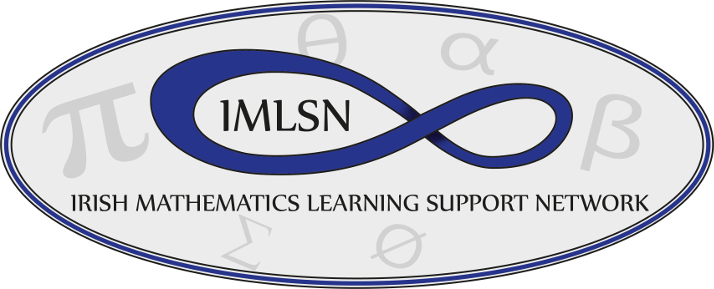Date: Friday 29th May, 2015.
Location: University College Dublin.
Workshop Theme: ‘Maximizing the Impact of Digital Supports in Mathematics Learning Support in Higher Education’.
Invited Speakers
- Dr Chris Sangwin, Senior Lecturer in the Mathematics Education Centre at Loughborough University (now of the University of Edinburgh).
- Dr. Shazia Ahmed, Maths Adviser & Co-ordinator of NUMBER Student Maths Support at the University of Glasgow.
- Dr. Madonna Herron, Lecturer in Mathematics/Theoretical Computer Science at the Ulster University at Jordanstown.
Organiser
- Anthony Cronin, University College Dublin.
The event was supported by the Irish Mathematics Society (IMS), University College Dublin and the National Forum for the Enhancement of Teaching and Learning in Higher Education.
Workshop Report
Keynote Address:
The keynote address was by Dr Chris Sangwin of Loughborough University (now of the University of Edinburgh).
Title: Using GeoGebra as a problem solving tool.
Abstract: In this talk I will demonstrate how software such as GeoGebra can be used as a dynamic problem solving tool in mathematics. GeoGebra enables a user to undertake direct experiments in mathematics to test a conjecture or explore some area of mathematics. This is particularly useful in elementary mathematics where simple algebraic expressions and graphs often have a strong interplay. It has a potentially very useful role in mathematics support, providing students of all abilities with an opportunity to visualise and experiment. I will also report on my experiences of using this software to support a problem solving class with higher achieving students. Participants are expected to bring a laptop or other device capable of running GeoGebra software during the session.
A pdf of the presentation can be downloaded here.
The following is a video of the presentation.
Short talks:
The first short talk was by Dr. Jonathan Cole from Queen's University Belfast.
Title: Development of an app to support learning in A-level maths.
Abstract: This project involved producing an app for smart devices to enable modernised learning for A-level maths students. Research in a stakeholder school showed that all pupils surveyed within the upper-secondary level owned a smartphone and most owned a tablet also, emphasising the opportunity for using apps to support learning. The app was developed using iBuildApp, an online app-creation programme which requires no programming. Past exam questions and solutions, notes and video tutorials were included and the topic was vectors, identified by teachers as problematic. Pupils generally found the app easy to use and wanted further development. The videos were popular despite this not ranking highly as a preferred method of revision previously. Teachers were happy for pupils to use the app to supplement their learning, both in the classroom and outside.
A pdf of the presentation can be downloaded here.
The second short talk was by Dr. Shazia Ahmed from the University of Glasgow.
Title: Providing academic support and improving transition into university life through Facebook groups.
Abstract: Four years ago Facebook groups were set up for level 1 Mathematics and Computing Science students to evaluate whether this could be a viable alternative to traditional Peer Assisted Learning (PAL) sessions. Due to their success more were introduced over the years and we now have groups for the whole College of Science and Engineering. Senior students join these groups, and their input is invaluable: they answer questions from junior students (which we?re often unable to answer) helping to alleviate concerns from those beginning university, and continuing to help them throughout their university careers. In addition, these groups are used by students to share questions with each other, and virtual PAL sessions happen spontaneously. Students also share resources, ask when and where lectures and labs are and generally support each other. With most students studying three subjects in first year, students can often lack a sense of belonging which this addresses. We will provide examples of such interactions and also discuss how our real and online groups complement each other. For example we host regular mathematical film screenings and maths games sessions which we advertise by setting up Facebook events and sharing them via our Maths Facebook groups. We will end by looking at examples of student feedback, and some analysis of the interactions within the groups.
A pdf of the presentation can be downloaded here.
The following is a video of the presentation.
The third short talk was by Nuala Curley from University College Dublin.
Title: To collect and analyse useful qualitative data on mathematical difficulties as experienced by students in a Mathematics Support Centre - A challenge?
Abstract: Since September 2009, the Mathematics Support Centre (MSC) in University College Dublin (UCD) has kept an electronic record of each student visit to the Centre. We describe our efforts, and those of the tutors, over the last eighteen months to collect this data. We realized that to identify the mathematical topics with which students experience difficulty we needed to identify the nature of the data we required and then work with the tutors to find ways that this could be done efficiently. The collection period involved eight weeks of intensive collaborative work with the tutors to ensure we obtained high quality and authentic data for our research study.
A pdf of the presentation can be downloaded here.
The following is a video of the presentation.
The fourth short talk was by Dr. Madonna Herron of the Ulster University at Jordanstown.
Title: Using pencasts to extend and enrich the student learning experience.
Abstract: This workshop describes the use of the Livescribe smartpen to produce opencasts that are shown to extend and enrich the learning experience of students in mathematics and engineering programmes at Ulster University. This evolutionary technology yields significant benefits over traditional pen and paper, offering an effective 21st Century teaching resource to support the learning and teaching of mathematics.
A pdf of the presentation can be downloaded here.
The fifth short talk was by Dr. Cormac Breen of the Dublin Institute of Technology, Ciarán O’Sullivan of the Institute of Technology Tallaght and Damian Cox of the Institute of Technology Blanchardstown.
Title: Mathematics Learning Support across a Multi-Campus Institution: A Trial of Virtual Support.
Abstract: In this presentation, we will outline a study that was undertaken across the three Institutes intending to form the Technological University for Dublin: Dublin Institute of Technology, Institute of Technology Blanchardstown and Institute of Technology Tallaght. This study consisted of a survey that was circulated to both staff and students in each of the three Institutes. This survey was an attempt to identify the students' needs for Mathematics Learning Support (MLS) in each of the Institutes as well as the preferred method of provision of MLS, on a scale ranging from exclusively online to exclusively in person. Following on from the results of this survey, a virtual drop-in service was run on a trial basis. As well as outlining the results of the survey, in this presentation we will also discuss the virtual drop-in process and the feedback received from the students who took part in the trial.
A pdf of the presentation can be downloaded here.
The following is a video of the presentation.
The last short talk was by Dr. Gerry Golding of the Open University.
Title: Virtual Mathematics Support at the Open University.
Abstract: The virtual mathematics support centre is a pilot project under development in Ireland for Irish students studying service mathematics with the Open University (OU). Delivered over the moodle platform, the centre will offer stage one and stage two students, access to digital mathematics support resources, primarily developed by the OU, but supplemented by links to external resources. Using screencasts, wikis, forums, dedicated context based online workshops, and one to one drop in sessions in our OU Live rooms (blackboard collaborate), the project aims to complement our new tuition strategy by providing an alternative learning experience for students struggling with mathematics.
A pdf of the presentation can be downloaded here.
The following is a video of the presentation.
The Workshop concluded with a Round Robin Panel Discussion.

